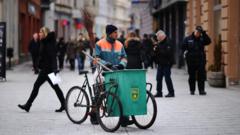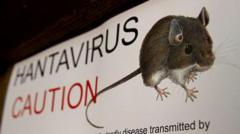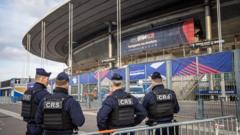As Sarajevo finds itself facing a dire public health challenge, social media is overflowing with images of rats swimming in the Miljacka River, highlighting the grim state of sanitation. The city’s poor public service has resulted in overflowing trash bins and illegal dumping sites, creating fertile ground for rodents to proliferate. Citizens are voicing their frustration over the lack of action taken to remove dead animals from parks, including playground areas where children play.
Health professionals are sounding the alarm as cases of leptospirosis—a disease transmittable by rats—are surging. Within a single day earlier this week, the largest hospital in Bosnia and Herzegovina reported a dozen new cases. The disease, often referred to as "rat fever," typically spreads via water or soil contaminated with rodent waste, leading to symptoms that range from flu-like aches to severe complications such as jaundice and kidney failure in its most acute form.
In response to the crisis, Sarajevo's local authorities have invoked emergency measures to tackle the rodent population. A coordinated cleanup effort is underway, with additional city workers dispatched to sanitize public areas and more frequent trash collection services scheduled. Schools have also been instructed to clean playgrounds, trim grass, and conduct inspections of their basements to eradicate any rat presence.
This decisive action starkly contrasts the inaction of the previous two years, where there were no pest control efforts, attributed to administrative mishaps in securing extermination services. Sarajevo Canton’s Health Minister Enis Hasanovic described the ongoing situation as a "communal crisis," emphasizing the local government's failure to uphold hygiene protocols.
Concern remains high as health experts warn of potential worsening conditions, with former university hospital director Sebija Izetbegović indicating that the well-fed rat population could lead to additional diseases like hantavirus. While the current leptospirosis outbreak has not resulted in severe cases, the threat remains, with untreated infections risking fatality rates exceeding 50% in critical instances.
For now, Sarajevo is navigating through a health emergency, but as efforts intensify, the hope for a cleaner and healthier city persists.
Health professionals are sounding the alarm as cases of leptospirosis—a disease transmittable by rats—are surging. Within a single day earlier this week, the largest hospital in Bosnia and Herzegovina reported a dozen new cases. The disease, often referred to as "rat fever," typically spreads via water or soil contaminated with rodent waste, leading to symptoms that range from flu-like aches to severe complications such as jaundice and kidney failure in its most acute form.
In response to the crisis, Sarajevo's local authorities have invoked emergency measures to tackle the rodent population. A coordinated cleanup effort is underway, with additional city workers dispatched to sanitize public areas and more frequent trash collection services scheduled. Schools have also been instructed to clean playgrounds, trim grass, and conduct inspections of their basements to eradicate any rat presence.
This decisive action starkly contrasts the inaction of the previous two years, where there were no pest control efforts, attributed to administrative mishaps in securing extermination services. Sarajevo Canton’s Health Minister Enis Hasanovic described the ongoing situation as a "communal crisis," emphasizing the local government's failure to uphold hygiene protocols.
Concern remains high as health experts warn of potential worsening conditions, with former university hospital director Sebija Izetbegović indicating that the well-fed rat population could lead to additional diseases like hantavirus. While the current leptospirosis outbreak has not resulted in severe cases, the threat remains, with untreated infections risking fatality rates exceeding 50% in critical instances.
For now, Sarajevo is navigating through a health emergency, but as efforts intensify, the hope for a cleaner and healthier city persists.

















